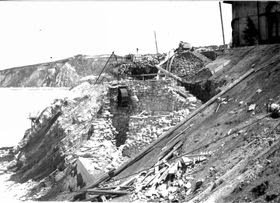History of Neighborhood Church – 1864-1931 By Dana Graham, President of the Palos Verdes Historical Society
History of Neighborhood Church – 1864-1931
By Dana Graham, President of the Palos Verdes Historical Society
Image: The iconic cave and waterwheel under construction -- 1928
The history of Neighborhood Church really begins with the birth of John Joseph Haggarty in London England, in 1864. By 1887 he had eared what amounts to a Masters Degree and emigrated to the US, landing in St Louis where he worked for a major dry goods retailer and discovered that he had a real aptitude for retail.
J J Haggarty
He then moved to Duluth, MN and in 1902 married one Bertha Schneider. 1905 found them in Los Angeles where he got into women’s clothing . . . not literally . . . the business. He founded a women’s clothing store which he cleverly named the New York Cloak and Suit House, aka Haggarty’s for short.
Sketch for a Haggarty's store remodel
The business boomed and by 1912, in those pre-income tax days, he had built a mansion at 3330 West Adams, then the fashionable district in LA just prior to Beverly Hills assuming that position.
3330 West Adams
Los Angles was pretty wild in those days and clearly he felt the need to be able to defend against an attack by the Teutonic Knights. By the way, the Holman United Methodist Church is now on that site. He also built a weekend (!) home at 1800 East Ocean in Long Beach, and tho I’ve seen a picture of that house, I don’t seem to have it.
So Bertha loved it at 3330 West Adams and had melded into the LA high society social scene, but two mansions were evidently not enough and there was this new development down the coast called Palos Verdes, where in 1927 Haggarty bought 5 lots on the bluff just below Malaga Cove Plaza and around the corner from the new Malaga Cove School – 421 Paseo Del Mar was the address in those days. Palos Verdes was the end of the earth with dirt streets, wooden water pipes, and hardly any residents – but the plans were wonderful and toward the end of the 1920’s the future looked bright with unlimited possibilities.
Lower Malaga Cove before construction began
Under construction on the bluff -- mid-1928
The front at completion
JJ hired then-prominent architect Armand Monaco to design a 15,000 square foot single level Spanish Revival mansion on the bluff, including 6-car garage. 4 bedrooms, 3 baths, 2 waterfalls, a large pool, fish pond, and a partridge in a pear tree.
1929 and most construction is completed
He imported Italian artists Achilli Disi and and Alfredo Orselli to do the custom artwork and over the top faux frescoes in vogue at the time, paying them the then-exorbitant sum of $100 per day. Permits were issued in January 1928 and the place was finished by the following October under the apparently efficient guidance of contractor Charles Anderson. Here is his picture in case you need any top notch work done.
General Contractor Charles Anderson
The place had such advanced-for-the-time features as full gravity heating, electric lighting throughout, the obligatory servants caretaker’s quarters, and even a built in sound system. The ornate iron work was made by the same company that made it for Hearst Castle.
The living room
In late 1929 the later-famous pier was added. I suspect by this time that Bertha and JJ were not getting along all that well because, in 1930, a second master bedroom for him was added adjacent to the original which overlooked Santa Monica Bay. It is now the church office and looks only into the scalloped stone wall that, by then, surrounded the property. The Haggartys came 4 times to oversee construction and to fully furnish the place, but they never moved in.
1930. Construction completed and the pier and PV Pool are in
Little did anyone suspect the economic cliff that loomed just over the horizon. In October, 1929, the stock market crashed, ushering in the most dire economic times in the country’s history, the only precedent being the Panic of 1837 for which Martin Van Buren was wrongly blamed – but let’s not get into that because no one remembered it then, and few do now. The business at Haggarty’s high end stores took a nosedive, and by mid-1931, he was forced to put his masterpiece up for sale.
We now leave the Haggarty mansion in 1931. The story will be picked up in Part 2 – 1931-1949.
Dana Graham, real estate expert, historian, PV Native and you can find Dana at www.danagraham.com
Dana is President of the Palos Verdes Historical Society.
















